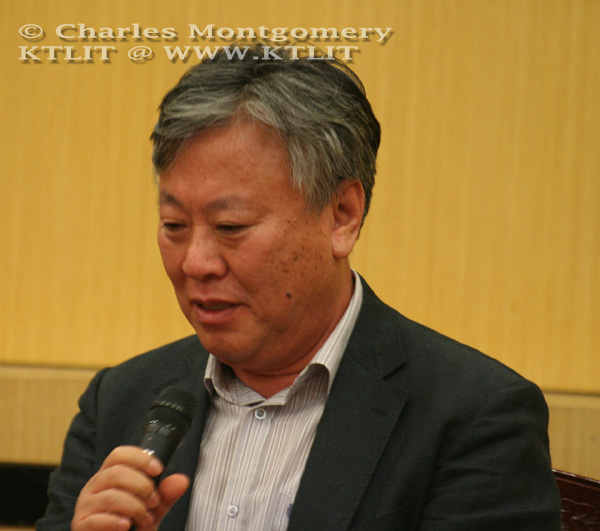So, on Thursday night I had to duck out of a soju-drenched Division meeting to head over the Hankuk University of Foreign Studies. HUFS had heard, somewhere, about a foreigner who was interested in Korean literature, and graciously invited me to a talk that Yi was to give. I would, of course, also double the “foreigner” content of the room as I was one of only two no-Koreans in the audience, the other being an (apparently) Russian woman. It is good, being one of the few foreigners identified as interested in Korean literature!
That sign up their is the from the conference, and I was amused that I could make most of it out, though it seemed to me like it claimed Yi was an expert on foreign literature. Perhaps my comprehension is not where it should be. 😉
I was interested, among other reasons, because Yi has not published anything since 1998 (unless there is something he talked about that I didn’t pick up) and I kind of wondered why he was out and about now (he is full-time lecturer, currently). I think I figured out the “why” of the thing, bit I’ll get to that in time.
The event went substantially long, as the crowd kept asking questions. My question was (in its entirety):
이문열 선생님,
미안합니다만 한국말 잘 몼어요. 저는 찔문이 잇숩니다.
지금 까지 책 네권이 영어로 번역되었는데. 다음에 번연될 책은 무엇입니까?
Except that on the fly I realized I had my count of publications wrong and had to change 네권이 to 다섯권이. But that also worked out ok…
That question is just mentioning how many of Yi’s books have been translated into English and asking what’s next.
I asked the question, in my fractured Korean (though it was understood), and Yi answered at considerable length. This is the Korean equivalent of Americans adding “a” to every word and yelling louder, and thinking that poor confused Mexicans will understand them. If you speak ANY understandable Korean to most Koreans, they assume you understand the entire language, 5,000 years of Korean history, the role of Chinese characters in the literature and spoken language, and you distrust the Japanese^^.
In any case, Yi seemed to be saying that “An Appointment With My Brother” is going to be re-translated and/or republished. That’s good, it was originally done in the Jimoondang series, but re-translations of some other works (Lee Dong-ha’s “A Toy City” leaps to mind as does Ch’oeYun’s “Last of Hanako”) from the Jimoondang series have been quite good.
After the lecture, I got the flipside of that conversational coin as an organizer came up to me as I tried to scarper, and repeating “shiksa, shiksa, shiksa,” violently pantomimed eating a large (and apparently alive) badger in front of me.^^
It was dinner, and I was invited.
This was too good of an opportunity to pass up, and so I walked with a group of 11 Koreans to a nearby sushi restaurant. In the interstitial time I played fanboy and had Yi autograph my copy of “Twofold Song.”At the restaurant, Yi held court and judging by the reactions of the group, he’s a pretty funny story-teller (This is kind of a “duh” moment, since all his work is well told and “The Poet” is pretty amusing in a non-jokey way). In between shots of soju, he had them in the palm of his hands
I understood very little, of course, I could get some flashes of a conversation about bad translation, and other than that just concentrated on picking up words. At he conclusion of the bad-translation conversation, attention turned to the role of the US in translation, and I was asked (well, sort of told) that the US played an imperialist role in translation. This is, of course, beyond argument, and I demurred, in that charming international way that I have, that the US, being an empire, was naturally prone to do those things that empires do. This included enforcing a kind of literary hegemony, particularly as the English language is (I hop over 27 slaughtered forests worth of ridiculous critical argument here) currently the hegemonic one. This seemed taken well by the table, which then went back to discussing things I couldn’t understand in remarkably high-velocity Korean.
One of the things I was able to pick up from the Korean, was that Yi is in the process of constructing his own personal library/cultural center (munhakkwan). When I heard this I asked one of the English speakers about it, and discovered that the center is in process and will be in Icheon, not so very far from Seoul. I suspect this is why he is back out on the lecture circuit but, as usual, I could be entirely wrong.
In any case, the meal was a great surprise, and now I’m spurred to meet more Korean authors. ^^
I also met, much to my pleasure, Wook Dong Kim, who is a Korean expert in Kim Yong-ik, long a favorite author of mine. I may have to take Sonsaengnim Wook out for a beer or two.




